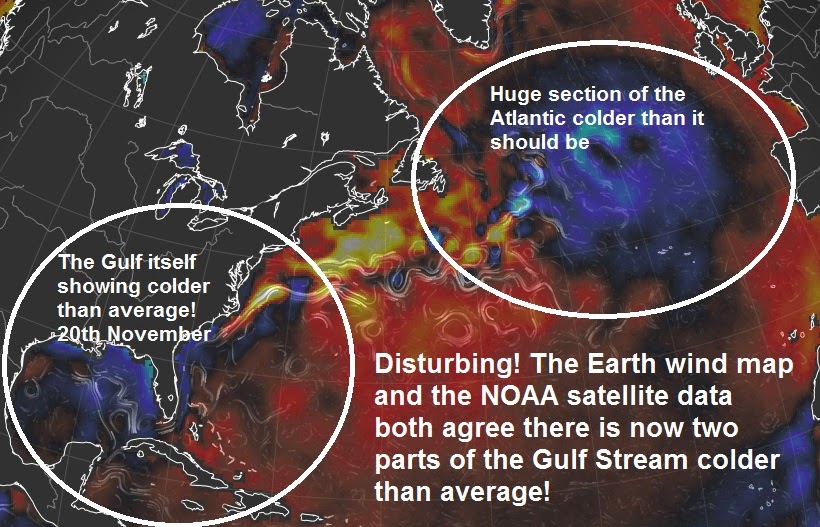
Credit: Gary Walton, The Big Wobble Almanac
– The news today supports JZ’s 2008 Byline that included the science from over 6+ years ago.
“Disturbing! The Gulf Stream Now Stalling In Two Broken Areas!”
“Are we witnessing the Gulf Stream closing down? Is the cold November in the US just a precursor of what is to come?”
“New data from The Earth Wind Map and The NOAA Data Satellite both agree and are now showing the Gulf Stream is colder than average in not one area but two!” quoting Gary Walton, The Big Wobble Almanac.
Read more
Click here for The Earth Wind Map.
Click here for The NOAA Data Satellite.
[NOAA is America’s National Weather Service]
– Excerpt from JZ’s 2008 Byline:
“Of recent concern is the momentum of the world’s ocean currents all linked together in a loop called the global ocean conveyor belt, in which the Gulf Stream of warm water flows to the East Coast of America and then merges with the deep cold-water currents from the northern Arctic waters. Scientists describe this belt as a giant “thermohaline pump” because it is driven by both temperature and salinity of the water. This pump powers up the continuous flow of the world’s ocean currents. At present, the effects of global warming have diminished the fragile balance of this pump to a low 49-percent capacity. What would happen to Europe if it ceased altogether? Would an ice sheet covering most of Northern America and Europe appear overnight? Would this be a new ice age? Scientists are worried because it has happened before. Research oceanographer, Dr. Ruth Curry, is very concerned because of the rapid ice melting in Greenland where the cold fresh water flows into the adjacent conveyor belt, essentially overwhelming its delicate balance. The recent decline of the belt’s momentum to 49-percent is due to Greenland’s meltdown. Scientists have determined that in the remote past this shut the system down, leading to an ice age. Are we ready for that to happen again?”
Read more
